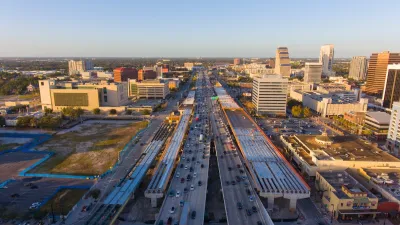As part of a Foreign Policy magazine special report on cities, Peter Calthorpe examines the form of China's urban growth, which is beginning to resemble the car-oriented development of the United States in the 1950s and 60s.
By 2020, China will add an additional 350 million people - greater than the entire population of the United States - to its cities. Already the world's largest car market, the country has embarked on a rampant road building program, putting it "in danger of making the same mistakes the United States made on its way to superpower status," writes Calthorpe. How China plans for these two related issues - the growth of its cities and the growth of its automobile culture - is a critical issue for people in China and around the world.
"The choices China makes in the years ahead will have an immense impact not only on the long-term viability, livability, and energy efficiency of its cities, but also on the health of the entire planet," argues Calthorpe. "Unfortunately, much of what China is building is based on outdated Western planning ideas that put its cars at the center of urban life, rather than its people. And the bill will be paid in the form of larger waistlines, reduced quality of life, and choking pollution and congestion. The Chinese may get fat and unhappy before they get rich."
Although Calthorpe observes that "Many Chinese officials, including at the highest levels, recognize the need to move beyond the automobile," he cautions that they, "have a limited window of opportunity to plan for prosperous, livable, low-carbon cities."
FULL STORY: Weapons of Mass Urban Destruction

Maui's Vacation Rental Debate Turns Ugly
Verbal attacks, misinformation campaigns and fistfights plague a high-stakes debate to convert thousands of vacation rentals into long-term housing.

Planetizen Federal Action Tracker
A weekly monitor of how Trump’s orders and actions are impacting planners and planning in America.

San Francisco Suspends Traffic Calming Amidst Record Deaths
Citing “a challenging fiscal landscape,” the city will cease the program on the heels of 42 traffic deaths, including 24 pedestrians.

Defunct Pittsburgh Power Plant to Become Residential Tower
A decommissioned steam heat plant will be redeveloped into almost 100 affordable housing units.

Trump Prompts Restructuring of Transportation Research Board in “Unprecedented Overreach”
The TRB has eliminated more than half of its committees including those focused on climate, equity, and cities.

Amtrak Rolls Out New Orleans to Alabama “Mardi Gras” Train
The new service will operate morning and evening departures between Mobile and New Orleans.
Urban Design for Planners 1: Software Tools
This six-course series explores essential urban design concepts using open source software and equips planners with the tools they need to participate fully in the urban design process.
Planning for Universal Design
Learn the tools for implementing Universal Design in planning regulations.
Heyer Gruel & Associates PA
JM Goldson LLC
Custer County Colorado
City of Camden Redevelopment Agency
City of Astoria
Transportation Research & Education Center (TREC) at Portland State University
Jefferson Parish Government
Camden Redevelopment Agency
City of Claremont




























